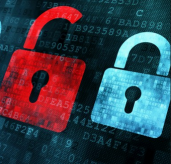As the holiday shopping bustle approaches, don't just think about buying the perfect gift and getting a great deal. For a happy and healthy season, remember that being cyber secure when you make your holiday purchases online is just as important!
This year PRIVATE WiFi has teamed up with the National Cyber Security Alliance to help consumers be safe online when using their mobile devices are they shop.
 Retailers are ready for you. The National Retail Federation said holiday sales in November and December are expected to reach $616.9 billion, an increase of 4.1 percent over 2013.
Retailers are ready for you. The National Retail Federation said holiday sales in November and December are expected to reach $616.9 billion, an increase of 4.1 percent over 2013.
Scammers are ready to try to make it their happy holidays too. They'll try to tempt you with confusing deals, bait and switch, hacking and outright fraud.
 We have to admit that cyber criminals and scammers are very artistic and inventive individuals. They seem to always find a way or two in trying to trick computer users into falling to their traps.
We have to admit that cyber criminals and scammers are very artistic and inventive individuals. They seem to always find a way or two in trying to trick computer users into falling to their traps.
For most of us, these three terms seem to denote the same thing. However, they are very different from each other. Let’s take a look at their definitions.
 With the recent data breaches involving a few business giants including Target, Home Depot and Staples, data protection has never been more significant than ever.
With the recent data breaches involving a few business giants including Target, Home Depot and Staples, data protection has never been more significant than ever.
Cyber security is certainly a responsibility that should be shared by everyone. People and employees are the most valuable asset of any organization, yet human errors cause the lion’s share of information security breaches.
 The incidence of identity theft has increased drastically over the last few years and it continues to be one of the fastest-growing crimes in the United States. There is a thriving online international black market in stolen identities that local, state, federal, and international law enforcement seem powerless to stop.
The incidence of identity theft has increased drastically over the last few years and it continues to be one of the fastest-growing crimes in the United States. There is a thriving online international black market in stolen identities that local, state, federal, and international law enforcement seem powerless to stop.
In fact, it has gotten so easy to steal and sell identities that prices have come down dramatically over the past two years. Why does it seem like it is getting easier for the bad guys and harder for good people like us? Because our information is spread out around the Internet and its protection is out of your hands.
 It’s hard to believe but social media has now certainly become an integral part of our dailiy lives, whether we like it or not. Nearly three-quarters of adults who go online use a social network of some kind.
It’s hard to believe but social media has now certainly become an integral part of our dailiy lives, whether we like it or not. Nearly three-quarters of adults who go online use a social network of some kind.
 The Anti-Phishing Working Group (APWG) recently released a report exposing that the number of phishing sites in the first quarter of 2014 leaped 10.7 percent over the previous quarter. 2013 is considered seen as one of the heaviest years for phishing on record. Q1 2014 perpetuated that trend posting the second-highest number of phishing attacks ever recorded in a first quarter.
The Anti-Phishing Working Group (APWG) recently released a report exposing that the number of phishing sites in the first quarter of 2014 leaped 10.7 percent over the previous quarter. 2013 is considered seen as one of the heaviest years for phishing on record. Q1 2014 perpetuated that trend posting the second-highest number of phishing attacks ever recorded in a first quarter.

 Malware is a collective term for various types of malicious software that infect a user’s computer. These include viruses, worms, Trojans, rootkits, spyware, adware, and several others.
Malware is a collective term for various types of malicious software that infect a user’s computer. These include viruses, worms, Trojans, rootkits, spyware, adware, and several others.
Malicious software is becoming a bigger problem with each passing year, and it is growing at an increasingly faster pace than ever before. In fact, last year there were 74,000 new computer viruses created every single day on average.
 Data breaches have been dominating headlines recently... It also comes with a good reason and bad intentions. The number of identity fraud victims jumped to 13.1 million in 2013, a new report from Javelin Strategy & Research finds. That's an increase of 500,000 from 2012 and the second highest number of victims since Javelin began conducting its annual study in 2004.
Data breaches have been dominating headlines recently... It also comes with a good reason and bad intentions. The number of identity fraud victims jumped to 13.1 million in 2013, a new report from Javelin Strategy & Research finds. That's an increase of 500,000 from 2012 and the second highest number of victims since Javelin began conducting its annual study in 2004.
 As part of Microsoft’s longstanding commitment to privacy, they have just released their findings and results of a survey that shows the privacy attitudes of technology savvy individuals in the US and four European countries (Belgium, France, Germany and the UK).
As part of Microsoft’s longstanding commitment to privacy, they have just released their findings and results of a survey that shows the privacy attitudes of technology savvy individuals in the US and four European countries (Belgium, France, Germany and the UK).
Most people think that their computers or mobile phones can only be hacked if they download a program or go onto a website that looks suspicious. However, the latest ring of cyber attacks point to a completely different method of infection.




